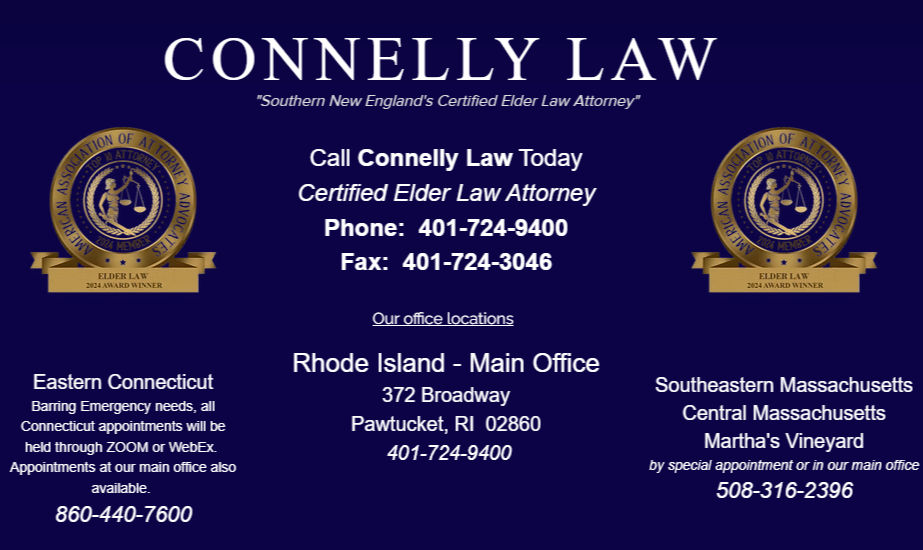The Hidden Risks of Using Online Estate Planning Services
- CONNELLY LAW
- Sep 22, 2025
- 7 min read

"In today's rapidly evolving digital landscape, online services proclaim to deliver swift and hassle-free solutions for an array of needs, including the critical matter of estate planning," stated professional fiduciary and certified elder law Attorney RJ Connelly III. "While these platforms can provide a convenient and, in some cases, cost-effective way to draft wills and oversee estate management, it's crucial to be aware of the potential hidden pitfalls that may accompany them—pitfalls that could lead to significant and costly unforeseen consequences."
In today's blog, we will do an in-depth exploration of the hidden risks of using online estate planning services, shedding light on the nuanced complexities involved, and engaging in a thoughtful discussion about why placing complete reliance on these digital services may not adequately address the diverse and unique needs of every individual.
Understanding These Services
Online estate planning services have revolutionized the process of drafting essential legal documents such as wills, trusts, and powers of attorney, allowing individuals to create these important documents from the convenience of their own homes. However, the ease of access this technology provides can be misleading. Many users engage with these platforms without fully understanding the intricate complexities that accompany effective and comprehensive estate planning.

Recent statistics reveal a significant gap in estate preparedness, with nearly 60% of Americans lacking a will. While online services strive to address this issue by providing accessible templates and guidance, the documents generated often fall short in terms of both comprehensiveness and legal enforceability—a level of assurance that typically comes when consulting with a qualified estate planning attorney.
Users may not be aware of the nuanced legal language, specific state laws, and individual circumstances that must be taken into account when crafting these documents. This lack of knowledge can lead to critical oversights, such as failing to adequately specify beneficiaries, overlooking tax implications, or inadvertently creating conflicts within the estate. Unfortunately, these issues may not become apparent until it is too late, underscoring the importance of seeking professional legal advice when handling such significant matters.
Zelda's Story
Zelda, a retired professor at a local college, grew up in New Bedford, where she and her late husband had accumulated a significant amount of waterfront property. She had taken the proactive step of completing an online estate plan shortly before suffering a massive stroke. However, before this medical event, she had been diagnosed with early-stage Alzheimer’s disease, which began to affect her cognitive function, coincidentally around the time she had completed the online documents.

It was also at that time that her oldest son, Dennis, had assumed the role of her primary caregiver, providing daily support and assistance, especially as her condition progressed. This created a significant and complex problem following Zelda’s passing, as the majority of her estate was left to Dennis, with the remainder split among three other children and their families.
This led to a contentious legal battle concerning the validity of Zelda's online planning. The siblings' attorneys raised serious questions about Zelda's mental capacity at the time the documents were completed. They sought to prove that the signature and answers provided in the online forms accurately reflected Zelda’s intentions.
Concerns were voiced regarding the legitimacy of the online questionnaire attributed to Zelda, particularly in light of her declining cognitive abilities. The uncertainty surrounding her mental capacity prompted questions about whether she could have accurately completed the form herself. Adding to the complexity of the situation were lingering doubts about who might have been present during the formulation of the plan.

The questions raised during the proceedings emerged as substantial red flags, echoing concerns about the potential influence on decision-making or the diminishing sound judgment attributable to her Alzheimer's diagnosis. The ensuing legal battles not only prolonged the estate's resolution for nearly three arduous years but also siphoned off significant financial resources. This drawn-out contest over the probate process led to mounting legal fees that severely diminished the inheritance's overall value. The estate’s shares suffered as a result, underscoring the complex and often troublesome repercussions that can arise from relying on online estate planning services.
Why DIY Plans Fail
Zelda's journey highlights a growing trend in the realm of DIY estate planning, a route that many individuals are now exploring. However, the precise failure rate of these self-created plans remains elusive and challenging to quantify. Legal experts frequently observe a range of persistent and potentially costly missteps that significantly contribute to the invalidity of some of these plans. As accessibility to online resources increases and more seniors embrace technology, elder law attorneys anticipate a notable rise in complications stemming from DIY approaches. Among the most common pitfalls are:
Failure to follow state laws. Estate and will laws are governed by regulations specific to each state, leading to considerable variations in their requirements and procedures. This means that an online template for drafting a will may not adhere to the legal standards of your particular state. For instance, certain states might impose distinct rules regarding the number of witnesses needed or the necessity of notarization, which are crucial steps in ensuring the validity of your will. It’s essential to understand these nuances to avoid potential legal complications in the future.

Improper execution. Mistakes often occur during the critical process of signing and witnessing a will, and these oversights can, unfortunately, render the entire document invalid. Common pitfalls include improper notarization, where the required signatures are not correctly validated, or failing to secure the presence of enough witnesses to meet legal standards. Additionally, there’s the risk of using a beneficiary as a witness, which can lead to significant complications when the will is executed. Each of these errors underscores the importance of meticulous attention to detail in ensuring that a will is legally sound and reflective of the true intentions of the testator.
Ambiguous or unclear language. Ambiguous language in a will can sow discord among heirs and result in considerable delays and unforeseen expenses throughout the probate process. Legal terminology is crafted with meticulous precision, and the absence of clear, unambiguous language can pave the way for misinterpretations and conflicts. When terms are vague, the intent of the deceased may be misread, leading to disputes that could have been easily avoided with precise wording. The stakes are high, as ensuring clarity not only preserves relationships but also expedites the legal process, safeguarding the interests of all parties involved.

Not accounting for all assets. DIY estate plans frequently overlook the crucial details regarding the management of various assets. For instance, certain assets—like life insurance policies, 401(k) retirement accounts, and bank accounts designated for payable-on-death transfers—bypass the probate process and are directly passed on to beneficiaries. Additionally, jointly held assets are likewise transferred outside the constraints of a will. A poorly crafted plan may fail to harmonize these diverse types of assets effectively, leading to potential complications and conflicts among heirs. It's essential to ensure that all components are thoughtfully coordinated to create a seamless transition of wealth.
Inadequate asset protection. Online forms provide a generic, "one-size-fits-all" solution that often overlooks the intricacies of individual circumstances. This can result in significant consequences, such as leaving valuable assets vulnerable to unforeseen risks, leading to higher tax liabilities, and neglecting the distinct requirements of diverse family structures. For instance, families with blended dynamics or those supporting beneficiaries with special needs may find their unique situations inadequately addressed, potentially jeopardizing their financial well-being and security.

Outdated documents. Numerous individuals overlook the importance of revising their DIY estate plans following significant life events, such as the joyous occasion of a marriage, the heart-wrenching process of a divorce, the arrival of a new baby, or the sorrowful passing of a loved one. It's crucial to recognize that in certain states, entering into a new marriage can automatically nullify an existing will, leading to potential complications and unintended consequences. Keeping your estate plan up to date is essential to ensure that your wishes are honored and your loved ones are protected.
Unfunded trusts. When embarking on a DIY estate planning journey that incorporates a trust, it's crucial to understand a common oversight made by many individuals: the failure to properly "fund" the trust. This process involves transferring ownership of one's assets into the name of the trust, ensuring that it is equipped to serve its intended purpose. Unfortunately, when this step is neglected, the trust remains devoid of any assets, rendering it essentially hollow and ineffective. As a result, the assets that were meant to be sheltered within the trust will still be subjected to the complexities of probate, defeating the very purpose of establishing the trust in the first place.
The Value of Professional Guidance
Considering the risks associated with online estate planning services, it's crucial to value professional guidance. Engaging an experienced estate planning attorney offers personalized advice tailored to your specific needs, ensuring your documents are not only legally sound but also reflective of your true intentions.
An elder law attorney can help navigate complex family situations, tax liabilities, and other critical factors that impact your estate plan. In fact, families that work with legal professionals can expect a smooth estate administration process that saves both time and money. The investment in a trustworthy attorney can provide significant peace of mind, protecting your legacy effectively.
A Final Thought
"While online estate planning services may appear to be a quick fix for many, the hidden risks and potential pitfalls warrant caution. From creating incomplete documents to missing out on vital personalized legal advice, the implications can be profound," said Attorney Connelly. "For those looking to secure their legacy and ensure that their intentions are honored, it is imperative to weigh the pros and cons of online services against the invaluable support of professional guidance. By partnering with a skilled estate planning attorney, you can confidently navigate the complexities of estate planning, ensuring your wishes are respected and your loved ones are protected."

The information presented within this blog is intended exclusively for general informational purposes and should not be construed as legal, financial, or healthcare advice. The content, materials, and insights provided may not reflect the most recent developments in these fields and, therefore, should not be relied upon for personal or professional decisions. Further, this blog may contain links to various third-party websites, which are included solely for the convenience of our readers. It is essential to note that Connelly Law Offices, Ltd. does not automatically endorse or recommend the contents of these external sites. Given the complexities and nuances associated with legal, financial, or healthcare matters, we strongly encourage individuals to consult a qualified attorney, a professional fiduciary advisor, or a healthcare provider regarding any specific issues or concerns they may have. Your well-being and informed decision-making are of paramount importance to us.




Comments